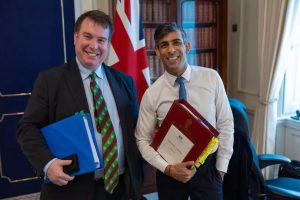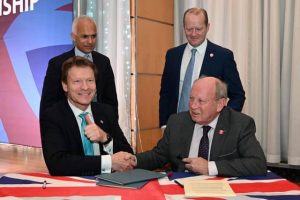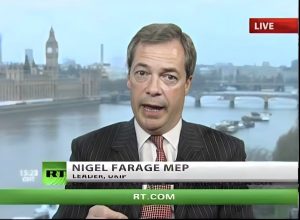Rishi Sunak’s Conservatives and their main challenger on the ‘right’ – Reform UK leader Nigel Farage – have dragged UK politics to a new low: a level of dishonour that combines farce and tragedy.
First the farce. Every day now brings a fresh story of senior Tory officials, MPs, or others in close contact with the Prime Minister, having placed bets on the election date. Now of course all this could be pure coincidence and they might not have been acting on inside information! Police investigations must eventually establish the truth.
What we already know for certain, is that had these people been professional footballers or involved in the management of a football club, and had placed bets on football, they would automatically face a lengthy ban, regardless of whether it could be ‘proven’ that they had cheated in any way.
The reason should be obvious. But for those close to Rishi Sunak, their first thought as the election approached wasn’t “how can I apologise to the British people for the mistakes of the past five years, and promise to do better if re-elected?” No – their first thought was: “how can I line my pockets for one more time, before being turfed out of office?”

With the Tories in total collapse, it’s understandable that many lifelong Tory voters are turning to Nigel Farage and his apparently radical ‘right-wing’ party, Reform UK.
But the truth is that Farage himself is dishonourable on a level that dwarfs the petty cheating and incompetence of Sunak’s team.
During and immediately after the Second World War, a new stereotype entered British culture and was often portrayed in comedy shows of that era. The “spiv” was a man who sought to make a fast profit out of others’ misfortunes, in an age of rationing and shortages. In real life, a disproportionate number of “spivs” were Jews – as was well known to the public at the time and has been established by modern historical research.
Following the so-called “big bang” liberalisation of the City of London in the mid-1980s, a new generation of spivs entered British life. While most of these operated within the law, they also operated with absolutely no regard for the UK’s national interest. The young Rishi Sunak profited from hedge fund speculations against UK banks during the financial crisis of the 2000s. And long before that, Nigel Farage’s first career was in the London Metals Exchange: his career was only modestly successful compared to Sunak’s, and eventually his commodities brokerage Farage Limited went bankrupt.
Farage’s blatantly dishonest spivvery has been in the political rather than the financial world.
His biggest con is his pretence of being anti-immigration. The slavishly pro-Farage channel GB News and much of the press have collaborated in this deception – but the truth is that Farage has always “welcomed immigration”, as he once told the European Parliament. Farage’s team promoted the idea of Brexit to UK-based Indians (including restaurant owners) on the basis that leaving the EU would mean that the UK could replace European workers with Indian, Bangladeshi and Pakistani workers.
And so it has turned out: with an extra helping of Africans added on top.
Farage and Reform UK now promise not to end immigration, still less to reverse the tide of immigration, but only to have a “one in, one out” policy: which of course would mean for the most part replacing White Britons and Europeans with non-White immigrants. Last year, for example, this Reform UK policy would have meant admitting 600,000 migrants.
None of this should come as any surprise. Farage is fundamentally committed to the toxic ideology of “free market” capitalism, which is essentially anti-nationalist, pro-immigration, and anti-White.
Those who are serious about ending immigration have two parties who fortunately are not standing against each other, and who in a small number of constituencies are offering voters a genuine patriotic alternative – the British Democrats and the English Democrats. Each of these parties is run by honest leaders who are genuinely committed on the immigration issue. Unfortunately they are standing in fewer than twenty constituencies, but they are sending a clear signal of the direction that UK politics could and should take in the post-Conservative era.
Could Farage and Reform UK be at least a step in the right direction?
No: because they are basically crooked.
Even aside from the immigration issue, Farage has shown himself to be untrustworthy on two other central issues of 2024.

Just a few weeks ago, Reform UK entered a pact with Traditional Unionist Voice, the party led by Jim Allister KC which promises to take Northern Ireland along with the rest of the UK into a genuine Brexit, rather than allowing a border in the Irish Sea – a trade barrier separating one part of the UK from the rest.
This sea border has come about because of a treacherous deal negotiated by Rishi Sunak’s government with the misnamed ‘Democratic Unionist Party’ earlier this year. At first it seemed that Reform UK agreed with TUV on a common platform of a real Brexit and no sea border. A pact was publicly announced on this basis.
But no sooner had the campaign begun than Nigel Farage unilaterally tore up this pact. In two constituencies – including the one being contested by TUV leader Jim Allister – Farage instead endorsed DUP candidates and betrayed his supposed TUV allies.
Quite incredibly, Farage was thus endorsing two of the very people who sold out Brexit and sold out the people of Northern Ireland.
He was able to do this because Reform UK has no genuine existence as a political party. It is a business rather than a constitutional party, and as the owner of that business, Farage can do whatever he likes.
He can issue a manifesto whose tax promises are the most dishonest and innumerate of any party; he can recruit or expel candidates on a whim; and he can make up policy as he goes along, to impress his gullible target audience of ageing reactionaries.

And now Farage has committed his foulest betrayal. Not content with betraying White Britons over immigration, and not content with betraying his erstwhile allies in Ulster, Farage now betrays those who are fighting at Europe’s frontier, those who are paying the ultimate price to defend their nation from Kremlin aggression.
Again, this came as no surprise to long-term Farage-watchers. He has for more than a decade been the most dangerous type of Putinist propagandist.
As serious historical students of propaganda know, the most insidious propagandists are not those who blatantly endorse every aspect of those whose interests they (deliberately or otherwise) serve.
Whether in the Second World War or the Cold War, the greatest success for a professional propaganda agency was to get someone to parrot treachery without it being obvious treachery. Thus, communist dupes in the West didn’t openly call for surrendering to Stalin, Khrushchev or Brezhnev – they called for “peace”. Moscow’s front organisations often had names such as “World Peace Council”.
Moreover, it’s been a longstanding practice of invaders and their proxies to call for “peace”, once their initial advances have ground to a halt. “Peace” of this sort rewards the invader and allows his forces to become firmly entrenched.
Those propagandising for an aggressor will do anything to avoid the central issue. They will point fingers in every direction, sometimes contradicting themselves, but always seeking to undermine firm action against the invader. And they will ignore basic historical and political facts.
So it has been with Farage. During 2010-14 (at a time when he was a relatively minor figure in UK politics) the then UKIP leader appeared seventeen times on Putin’s propaganda channel Russia Today.
RT itself was proud to claim that Farage “has been known far longer to the RT audience than to most of the British electorate”.
And he swiftly rewarded his Moscow friends. During an earlier Ukraine crisis in 2014, when Putin grabbed Crimea, Farage typically maintained that the Kremlin despot had been “provoked” and absurdly insisted that the European Union had “blood on its hands in Ukraine”.
The reality was (and is) that NATO and the EU had been far too weak, and it was their unwillingness to risk “provoking” Putin a few years earlier, when they failed to respond to appeals from Ukrainian nationalists for an alliance against Moscow, that encouraged Putin’s imperialism.
Ever since then, Farage’s cynical tactic has been to utter a few words distancing himself from Putin’s dictatorial behaviour, but then going on to endorse his foreign policy.
In 2014, asked which world leader he most admired, Farage replied: “as an operator”, Putin.
His short-lived successor as UKIP leader, Diane James, went further, describing Putin as one of her political “heroes”. Yet another UKIP leader, Paul Nuttall, agreed that Putin was “generally getting it right in many areas”.
In 2017 Farage again made token comments distancing himself from Putin’s imprisonment of journalists, etc., before saying that Putin was “a strong national leader”.
In 2018 speaking to an interviewer from Newsweek magazine, Farage was even more explicit in his policy of surrender to the Kremlin: “We would have done better to recognize that there are some big issues on which we have a shared interest with Russia. Instead, our foreign policy approach to Russia has been very confrontational.”
Following Putin’s notorious interview with Tucker Carlson earlier this year, Farage argued that the West should have discussed a “deal” with Putin immediately after the invasion. In other words, right from day one, Farage’s policy was not to resist the invader. His policy instead was one of craven surrender: a “deal”.
Absurdly, Farage’s argument was (and remains) that “our foreign policy approach to Russia has been very confrontational.” Not that the Kremlin was being “confrontational” by invading its neighbour, but that others had been “confrontational” in not bowing to Putin’s expansionist agenda.
Last week during his interview with the BBC’s Nick Robinson, Farage expanded on this theory.
We must remember that Farage is a man of limited formal education. He has never studied Russian or Ukrainian history; he has no personal experience of the region; and he has absolutely no academic training in military history, intelligence history, or strategic studies.
Yet like golf club reactionaries everywhere, as they prop up the bar and regale their fellow Rotarians, Farage is an instant expert and never admits that he might ever have been wrong about anything important.
Once again (as he has repeated since that interview) Farage made token, insincere, and weak comments distancing himself from Putin’s invasion. But he then went on to claim that the invasion had somehow been “provoked” by the West.
Essentially, therefore, Farage’s message can be paraphrased as – yes, the war is unfortunate and wrong, but the basic fault lies not with Putin but with the West: we should have given Putin most of what he wanted without war, and then the invasion wouldn’t have been necessary!
True strategic genius from the man who went straight from school to the London Metals Exchange without pausing to obtain an education.
When faced by an aggressor, says Nigel, don’t “provoke” him; don’t stand up him; instead – surrender in advance!
What Farage has never understood (or in his contrarian pursuit of American-style conspiracy theory, simply doesn’t want to understand) is that Putin was responding to a perception of Western weakness, not Western ‘provocation’.
The Kremlin misread signals and misread the determination of Ukrainian patriots.
Putin was correct that the Western response to his invasion would be slow. What he didn’t realise was that Ukrainian resistance would be so effective that his troops would grind to a halt, far short of their objective, and that an alliance of his neighbours, stretching from the Baltic to the Black Sea, would put some backbone into the cowardly ‘West’.
Farage – the ultimate political spiv – will never understand true patriotism. His ‘free market’, quick-profit mentality is fundamentally anti-nationalist and anti-White. He betrays his own political allies without a second thought.
To Farage, all this is ‘clever’ politics. To the rest of us, it is rank treachery which confirms that he is unfit for office.
Nigel Farage and Reform UK will doubtless play their part in destroying the Conservative Party – but if he and even a tiny group of Reform UK MPs are elected to Parliament, they will rapidly self-destruct.
Farage and his ilk are not and never will be part of a ‘transition’ to a better, patriotic politics. They are part of the problem: wholly unfit for office.



